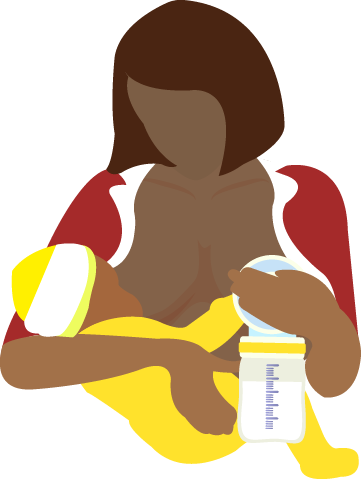- Breast milk is nutritionally perfect for your baby at birth and your milk changes as your baby grows to continue to meet their needs
- Breast milk helps your baby’s defense against illness, resulting in fewer doctor visits
- Breast milk doesn’t cost any money
- Babies easily digest breast milk, resulting in less constipation and diarrhea. Bowel movements and spit-ups have less offensive odors than formula
- Breast milk requires no preparation, heating, refrigeration, or cleanup. Breast milk is always ready and at the right temperature
- When either parent has a history of allergies, having breast milk only for the first couple of months can reduce the chance of your baby developing allergies
- Prenatal breast changes are complete by the fifth or sixth month of pregnancy
- The ability to breastfeed does not depend on the size of your breasts. If you have had any breast surgery, check with your provider about how it might affect your ability to breastfeed
- Women who have nipples that are flat, inverted, or dimpled can still breastfeed. Breast shells, worn inside your bra, can help your nipples extend outward
- Breastfeeding, although it is natural, is not an “instinctive” ability of mothers. It is learned, just like all the other new parent activities
- It is important to breastfeed frequently in the early days and weeks in order to properly establish your milk supply. This also allows you to spend more time with your baby
- Breastfeeding away from home is possible with a little planning and without embarrassment, making it easy to take your baby with you
- Returning to work and continuing to breastfeed exclusively is possible if you can regularly express breast milk while away from your baby. You can continue to partially breastfeed while you are at home, even if it is not possible to express milk at work
- Breastfeeding is not a reliable method of birth control. Some women will resume ovulating during breastfeeding. You should discuss an effective form of birth control with your provider
- Nipple toughening maneuvers (rolling, twisting, or rubbing) do not prevent soreness during the first 2 weeks of breastfeeding. In fact, prenatal nipple preparations or colostrum expression can start uterine contractions and possibly premature labor, and should be avoided. Sore nipples can be avoided by positioning the baby correctly
- Partners can be involved in breastfeeding in a number of ways, including bringing the baby to you at night, feeding expressed breast milk with a bottle once breastfeeding is well established, and providing support with household duties
- It is important to choose your foods wisely when you are breastfeeding, just as it was when you were pregnant. It is not necessary to avoid specific foods unless they make your baby fussy
- Because alcohol passes through your milk, it is not recommended during breastfeeding
- Too much caffeine can result in your baby being irritable
- Tobacco use is discouraged because nicotine passes into your milk and because exposure to cigarette smoke is unhealthy for your baby
- Check with your provider if you use any medicine
- Source: Marshfield Clinic
- Link: https://www.marshfieldclinic.org/specialties/obgyn/pregnancy/infant/pregnancy-info-breast-feeding


- April 4, 2021
- by Admin


